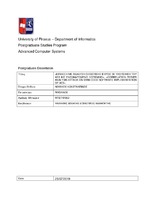Επίθεση με ανάλυση συσχέτισης ισχύος σε υλοποίηση του AES με ενσωματωμένο λογισμικό
Correlation power analysis attack on embedded software implementation of AES

View/
Abstract
Implementations of cryptographic algorithms often leak information through various means, such as power consumption, electromagnetic emission, execution time, heat or even sound. Every attack that aims on taking advantage of these kinds of leakage is called Side Channel Attack (SCA). Power analysis (PA) SCA attacks focus on studying power consumption during the execution of an algorithm. In this master thesis we study PA SCA against software level implementations of AES-128 running at a development board which integrates an ARM®32-bit Cortex®-M3 microprocessor. Measuring and analyzing the power consumption of our development board can reveal the secret key of the encryption. Thus, there is a major security risk which is necessary to be considered at the implementation level. Countermeasures against SCA can be implemented both at hardware and software level. One of the most powerful countermeasures against PA SCA is masking. In masking technique, we randomize the intermediate values of an algorithm by concealing it with a random value (mask). We perform attacks both on unprotected and masked software implementations of AES-128. We manage to acquire the secret key of an unprotected AES-128 implementation and present the security of masking technique against first order attacks.

